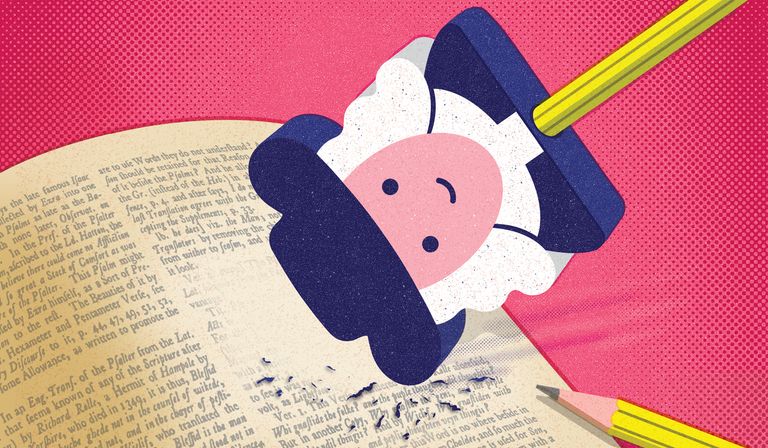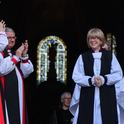On a weekend trip to Brighton, three friends and I are watching some standup comedy in a small, hot room. We’re almost the only people there, and the comedian picks us out and asks how we know each other. A friend next to me answers, and I can hear the smile in their voice; we like telling this story. “Christian camp!”
It’s a good conversation starter, let alone a good comedy starter, because it feels like a complicated story. The camps we attended almost every summer from the ages of 11 to 18 were run by Quakers—or the Religious Society of Friends—a group with Protestant roots. About 50 of us from across the country would spend a week at a boarding school, exploring big questions about spirituality and social justice. Workshops and talks were punctuated by talent shows, bouncy castles and fancy-dress discos. One year, we were taken out to the field and taught the mechanics of peaceful protest—a core Quaker practice—spending an hour or so learning how to resist being moved by police by locking our arms together and lying limply on the ground.
I loved these gatherings. How could I not? I’d found a community and a way to get in touch with spirituality, and that meant that I definitely felt like a Quaker. But I was very unsure whether I believed in God. Describing my experience there as Christian has never felt quite right to me.
This same tension has been rippling through the wider Quaker community in recent years. Many Quakers today describe themselves as agnostic, nontheist or atheist—a contrast with Quakerism’s explicitly Christian roots, and one which has prompted questions about the group’s future.
Founded amid the religious and social tumult of the mid-17th century by George Fox, a preacher from Leicestershire, Quakerism emerged from a profound disillusionment with the established church. Intervention by ritual or priests was not required, Fox believed, for humans to access God. Since then, the group has had an outsized impact on British political and social life: the first religious movement to condemn slavery, Quakers went on to champion prison reform and, more recently, carry out pioneering work in international conflict mediation and humanitarian aid.
The belief that every person can experience God directly means that Liberal Quakerism—the most common kind in Britain—has no fixed creed and no ministers. Quaker Meetings are mostly silent, and attendees, known as Friends, stand and speak when they feel moved to, without preparation. Quakerism has also used a range of terms for God since its foundation, including “Christ”, “Spirit”, “Light” and “Truth”, acknowledging that everyone’s experience of the divine is different.
Today, “no British Quaker would really imagine that how they define their spiritual experience would be right for anybody else,” says Ben Pink Dandelion, professor of Quaker studies at Woodbrooke Quaker Study Centre and the University of Birmingham. (Ben became “Pink Dandelion” while living at an anarchist peace camp, in protest at the practice of passing down fathers’ surnames.)
British Quakerism’s main commitment, he says, is to the ambiguity itself: “It’s very much a ‘perhaps’ kind of organisation, but it’s dogmatically ‘perhaps’.”
In the last few decades, a form of “liberal-Liberal Quakerism”, or “hyper-Liberal Quakerism”, has emerged. There’s no explicit expectation to believe in God or the divine in this tradition, which actively welcomes those who don’t and people who follow other faiths. Today, there are Friends who identify as Buddhist Quakers, Muslim Quakers, Pagan Quakers and more.
A form of ‘hyper-Liberal Quakerism’ has emerged
This was the Quakerism I grew up with. I certainly heard people use biblical language, and read and discussed texts which referenced God, but there was plenty on offer for people who didn’t necessarily connect with that. There was plenty on offer for me.
It was a rare chance, outside the usual structures of party politics and school, to think seriously about spirituality and have proper conversations about important ideas. Along with summer camp, I attended my local Meeting on Sunday mornings, in a beautiful cottage-y Meeting House with flowers around the door. A few dozen people, of all ages, would sit together and settle into an hour’s silence. Sometimes the quiet would be broken, often by Friends offering reflections on politics, or their personal lives, or something they’d read. These Meetings were energising and full of warmth, but I found the stiller ones the most powerful. Even as a small child perched on a knee, I was aware of a deep sense of togetherness that went beyond anything I’ve since experienced in secular group meditation.
This is an experience shared by Miriam Yagud, who identifies as atheist and Jewish, as well as Quaker. In 2011, she co-founded the Nontheist Friends Network, a group which regards “religion as a human creation” and advocate for “an open Society of Friends, confidently embracing a radical diversity of understandings”. For her, Quaker Meetings provide a connection with something beyond the self: “We are social beings, and there’s a matrix that is created every time a group of people gets together… it’s not a religious experience, it’s a human experience.”
“To me,” she continues, “that is what the Quaker practice honours and acknowledges—the thing that we have no words for. That’s why I’m comfortable in Quakers as an atheist.”
Nontheism in Quakerism isn’t new—the first official organisation to cater to this demand, the Humanistic Society of Friends, was founded in Los Angeles in 1939—but it is growing. In 1996, a survey by Ben Pink Dandelion suggested that “so many [British] Friends use non-Christian language to describe their religious experience that it would be intellectually dishonest to claim the group as Christian”. In 1990, one in every 29 British Quakers stated that they did not believe in God, rising to one in 14 in 2003, and doubling again to one in seven in 2013. By 2023, it was one in five.
That year, the proportion of British Quakers who stated that they did believe in God was almost identical to the national average, at just under half. In a different survey of British Quakers in 2008, which did not offer a “not sure” option, 90 per cent of respondents said they believed in God. Semantics matter with such a slippery subject, then, but beliefs within Quakerism are clearly shifting. The Society has always been radically open—but is it losing its identity?
This question has been pulled into sharp focus recently by plans to rewrite British Quakerism’s core text, which was first issued in 1738 and is known as the “book of discipline” (or the “big red book”). Different Yearly Meetings (large gatherings of multiple local Meetings) across the world produce their own versions of this book, outlining the beliefs and practices of their particular Meeting; there are more than 40 currently available. They are revised roughly every generation—Britain Yearly Meeting’s current version, titled Quaker Faith and Practice, was published in 1995. The revision currently underway will, though, be the most comprehensive since 1967.
Made up of extracts from Quakers’ writings, as well as descriptions of structures and practices, the big red book is designed to describe—rather than dictate—what it means to be a Quaker. As a result, the revision process is collaborative, with British Quakers invited to submit comments and pieces of writing for consideration. Since Quakers make decisions in a collective, spiritual way, with no voting or hierarchy, the process will also be long: deliberations began in 2018 and will run until at least 2030, when a final draft will be presented to Britain Yearly Meeting for approval.
There’s a lot of discussion around the way the book deals with God. In part because it is mostly anthological, it has always used multiple spiritual terms—some explicitly biblical and some not, like “the Inner Light” or “love”. This language has changed between editions, too; although it is fundamentally a God-centric book, the current edition removed a number of references to “Christ” from the previous version.
When the new revision began, many British Quakers felt uneasy around how the edition would approach biblical language, says Paul Parker, who for the last 14 years has acted as Recording Clerk for Quakers in Britain—or the “closest Quakers get to a chief exec”. “There were simultaneously Quakers who stand in a firmly Christian framing for their Quaker beliefs, who were anxious that that might get lost,” he tells me, “and there were nontheists who were feeling that, if the book of discipline was revised, it might be revised in such a way as to put them outside the Society.”
He continues: “On both sides of that debate, I think we had people who were fearful about whether they would still be seen as proper Quakers.”
The committee tasked with managing the book’s revision acknowledged these worries, writing in 2022 that it was “aware that there are tender issues to be addressed, particularly around the question of how we describe our experience of the divine”, and that “we don’t expect everyone to agree about how we have chosen to approach this.” The next year, a report by the Nontheist Friends Network suggested that for some Quakers, a “religious vocabulary” centring on God is “problematic”. It hoped that the new book would reflect that “we are no longer an exclusively Christian church but an inclusive religious Society, a society of active seekers rather than satisfied finders.”
There is particular pressure around the wording of the marriage declaration used in British Quaker weddings, which is detailed in the book. As it stands, partners choose between two phrases—“through divine assistance” or “with God’s help”. It’s the only time when Quakers are required to make any kind of theological statement out loud. In 2022, questions were raised over whether to allow Quakers to use neither of those expressions, and responses were gathered from local Meetings across the country.
Some were supportive of the proposed change, suggesting that since Quakers who do not believe in God can be accepted as official Quaker members, they should not be required to use that language when they are wed. “Integrity is more important than superficial conformity,” asserted one Meeting’s minutes.
Others felt strongly in the opposite direction: that a Quaker wedding without reference to the divine would be no different to a civil marriage; that altering the wording would put British Quakers at odds with Quaker communities in other countries, in which biblical language is central; that core Quaker practices were at risk. Another set of minutes read: “We cannot be all things to all people; this will fail.”
Several Meetings had more fundamental questions about Quakers’ theological approach to marriage. In 2009, Britain Yearly Meeting decided to campaign for the right to marry same-sex couples. This was based, in part, on the Quaker belief that it is God, not the state or any individual, who joins two people together—or, in the words of founder George Fox, “we marry none; it is the Lord’s work, and we are but witnesses” (Quaker Faith and Practice, 16.01). God was already giving this gift of marriage to same-sex couples, the Yearly Meeting felt; Quakers’ task was to recognise that and celebrate it. But if supporting same-sex marriage was based on Quakers’ commitment to God’s work, would erasing reference to Him in some weddings destabilise the theological basis of that decision? Might it even “undermine public trust” in Quaker judgement? One Quaker committee was concerned that “other churches might question on what basis Quakers can really say they are led by God in their discernment on marriage, or, indeed, on anything at all.”
Some feel that broadening out available theological positions like this might fragment British Quakerism’s identity. Author and theologian Ben Wood, a self-identified “liberal conservative” Quaker, tells me he understands why many Quakers are uncomfortable with biblical language, but encourages them to connect with it on their own terms. This “is not about orthodoxy—it’s not about saying ‘nontheist Quakers should start believing in the vision of God that I have,’” he says. “It’s rather that, unless we have a shared space through which to be and feel Quaker… we’ll be very alone, while being together, which I think would be a great tragedy.”
Quakerism might not be best served by prioritising inclusion at all costs, he suggests: “Being Quaker may not be for everyone.”
Others feel that the Society is not in need of this kind of rigid definition, since Meetings are themselves a powerful binding agent. As Paul Parker puts it: “I think we need to focus on the quality of that experience, because that’s the thing that will hold us together as a community.”
“If you want to keep your flock together,” he says, “don’t build a fence—dig a well. The moment you start putting up a fence and saying, ‘If you’re the wrong side of that fence, you can’t drink at our well,’ you damage the integrity of that community.”
The question isn’t settled; a working group is still examining the wording of the marriage declaration. What is “definitely not” happening, though, is a wholesale removal of God—either from the declaration or from the book in general—says Parker. Instead, the book aims to reflect the range of viewpoints present among the community: “Hopefully every Quaker will be able to see something that speaks for them.” A rare point of agreement between everyone I spoke to was that this question about God is more a discussion than a debate—something shaped by conversation rather than argument—and one which Quakers are finding illuminating and useful.
A new cohort of young people is looking for a definitively religious community
In many ways—structure, decision-making, theological positions—Quakers are unique among Christian churches in Britain. But the Society is subject to the same general forces, one of which is a new cohort of young people who are looking for a definitively religious community. Unlike the majority of young Friends a few years ago, Ben Pink Dandelion explains, they see biblical language and a traditional, Christian framework as the Society’s core purpose—“younger Friends are saying, ‘Well, look, this is what we’re here for.’”
This is in step with broader patterns: a recently published Bible Society report found that monthly church attendance among 18- to 24-year-olds in England and Wales quadrupled, from 4 per cent to 16 per cent, between 2018 and 2024. They are now the second most likely age group to attend church regularly. The report links this rise to a cultural shift in which “having a Christian faith is again being normalised and is arguably even culturally attractive” and—in the context of a generation dealing with 21st-century pressures—to young people’s desire for “healing and community as well as a deeper sense of meaning in their life”.
There is another difference with the younger Friends, too, judging from my conversations with them: whatever their own approach to God, they are particularly tolerant of different views on the matter. As one put it to me, “older Friends find it easier to tolerate difference when it comes to things like sexuality than to tolerate differing views to their own when it comes to theism,” while the younger generation finds it easier to accept a range of interpretations.
“I think in future,” they added, “there will be less of a divide between theists and nontheists… people will start to care less about that distinction.”
The future of Quakerism as a whole is another talking point. The number of people attending Meetings in Britain has almost halved since records began in 1965, down from 30,209 to 17,937 in 2024. At a time when many people identify as “spiritual but not religious”, some feel that opening Quakerism up to a wide range of views is an essential adaptive strategy. The Nontheist Friends Network suggested in 2023 that inclusivity of different views on God is “appropriate and necessary if we are… to survive in the 21st century”.
The Society is grappling with the need to maintain its fundamental identity while also moving with the times—whether that means welcoming a diverse range of views on God or responding to political events (as Britain Yearly Meeting did this May by stating its belief that genocide was being perpetrated in Gaza). Quakerism exists somewhere between a “movement” with a “shared concern for something”, and a more rigid “organisation”, thinks Parker: “If we become purely movement, we’ll dissipate, and if we become purely organisation, we’ll go out of date and everyone will leave.”
But he’s optimistic: “If we can embrace the creativity in that tension, and say… ‘How do we do both those things together and keep those things in balance?’, then that’s really exciting.”
There’s a lot to indicate that Quakers are already combining stability and adaptability pretty well: not least the fact that the impassioned conversation around God and the big red book has been designed to take place over 12 years—and possibly longer—at which point it will have involved input from more than 60 Quaker Meetings and groups. This meticulous process does, though, call to mind one young person’s comment, submitted to the Future of British Quakerism Conference: “May future British Quakerism stop having committees about committees.”












